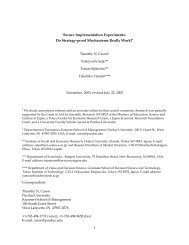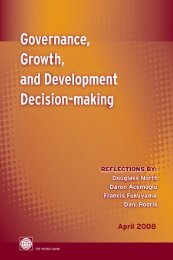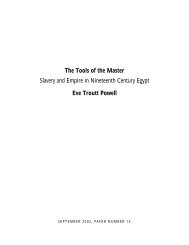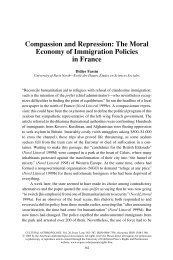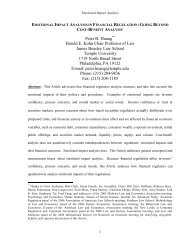Life & Times of Magda A: Telling a Story of Violence in South Africa
Life & Times of Magda A: Telling a Story of Violence in South Africa
Life & Times of Magda A: Telling a Story of Violence in South Africa
Create successful ePaper yourself
Turn your PDF publications into a flip-book with our unique Google optimized e-Paper software.
242 Current Anthropology Volume 49, Number 2, April 2008<br />
cisely what we want to call attention to by present<strong>in</strong>g the<br />
open<strong>in</strong>g scene <strong>in</strong> which she tells her story <strong>in</strong> the artificial<br />
environment <strong>of</strong> an academic sett<strong>in</strong>g. However, should this<br />
lead us to discredit her discourse as a mere “biographical<br />
illusion,” <strong>in</strong> Bourdieu’s (1986) terms? Obviously there is a<br />
limit to our knowledge <strong>of</strong> what happened to <strong>Magda</strong> as a child<br />
and an adolescent. But does the fact that we did not go to<br />
Lesotho to hear her dead uncle’s side <strong>of</strong> the story or to<br />
KwaZulu-Natal to listen to her vanished stepfather’s justifications<br />
call <strong>in</strong>to question any presentation and discussion <strong>of</strong><br />
the violence she says she experienced as Niehaus suggests?<br />
Certa<strong>in</strong>ly, the long-term <strong>in</strong>teractions we have had with <strong>Magda</strong>,<br />
our conversations with her mother, relatives, and boyfriend,<br />
and the more general knowledge we have gathered <strong>of</strong> this<br />
specific <strong>South</strong> <strong>Africa</strong>n context enrich and thicken our understand<strong>in</strong>g<br />
<strong>of</strong> her story, which, as our commentator himself<br />
admits, broadly converges with his own f<strong>in</strong>d<strong>in</strong>gs <strong>in</strong> the field.<br />
Nevertheless, they do not elim<strong>in</strong>ate our uncerta<strong>in</strong>ty and lack<br />
<strong>of</strong> knowledge about her story. No matter how hard anthropologists<br />
may try to document biographies, they are forced<br />
to abandon the fantasy <strong>of</strong> gett<strong>in</strong>g to the ultimate objective<br />
truth <strong>of</strong> people’s lives (Crapanzano 1980). This epistemological<br />
prudence should not, however, lead to any such disenchanted<br />
renunciation as that <strong>of</strong> judges who deprive asylumseekers<br />
<strong>of</strong> refugee status for fear <strong>of</strong> be<strong>in</strong>g thought too gullible<br />
(Fass<strong>in</strong> and d’Hallu<strong>in</strong> 2007). We have to make do with what<br />
the subjects tell us about their lives.<br />
Here Nuttall’s comparison <strong>of</strong> anthropology with literature<br />
is illum<strong>in</strong>at<strong>in</strong>g. By draw<strong>in</strong>g a parallel between the life and<br />
times <strong>of</strong> Michael K and <strong>of</strong> <strong>Magda</strong> A, we certa<strong>in</strong>ly called for<br />
such discussion: it meant distanc<strong>in</strong>g ourselves from naïve realism,<br />
as we also did by <strong>in</strong>vok<strong>in</strong>g Zaza Khuzwayo’s narrative,<br />
Matshikiza’s memories, and Root’s film. In fact we th<strong>in</strong>k that<br />
there are two ma<strong>in</strong> differences between Coetzee’s project and<br />
ours, one hav<strong>in</strong>g to do with facts and the other with authority.<br />
First, we believe that however obscure some aspects <strong>of</strong><br />
<strong>Magda</strong>’s story and problematic our reconstitution <strong>of</strong> it, she<br />
is not a character <strong>of</strong> fiction: she exists, as do her mother and<br />
her boyfriend, whom we know; she did lose her first child,<br />
whose burial caused family conflicts which we witnessed; she<br />
does have AIDS and receives treatment which has caused<br />
physical transformations that we have observed. While we<br />
were not there to testify to the facts she mentions about her<br />
childhood and adolescence, we know <strong>of</strong> several other stories<br />
which attest to the sort <strong>of</strong> violence she evokes (Le Marcis<br />
2004a) and several studies which statistically establish the frequency<br />
<strong>of</strong> sexual abuse before the age <strong>of</strong> 15 (Jewkes and<br />
Abrahams 2002). We thus plead for a well-tempered constructivism<br />
which <strong>in</strong>stead <strong>of</strong> systematically reject<strong>in</strong>g the facts<br />
related cross-checks them. This is what allows us to demystify<br />
the so-called virg<strong>in</strong>-cleans<strong>in</strong>g myth as a typically culturalist<br />
<strong>in</strong>vention on the basis <strong>of</strong> our own f<strong>in</strong>d<strong>in</strong>gs, our <strong>in</strong>terviews<br />
with psychologists specialized <strong>in</strong> sexual abuse, and empirical<br />
surveys conducted by others (Jewkes, Mart<strong>in</strong>, and Penn-Kekana<br />
2002), but it is also what makes us approach <strong>Magda</strong>’s<br />
life through the lens <strong>of</strong> a critical positivism.<br />
Secondly, we assume that an important task for anthropology<br />
is to make sense <strong>of</strong> what would otherwise rema<strong>in</strong><br />
un<strong>in</strong>telligible, that is, either abandoned to irrationality or <strong>in</strong>terpreted<br />
out <strong>of</strong> its social context: <strong>Magda</strong>’s life, we th<strong>in</strong>k, is<br />
understandable only with<strong>in</strong> the broader context <strong>of</strong> her times,<br />
that is, with<strong>in</strong> the political and moral economies <strong>of</strong> gender,<br />
race, and class under apartheid and <strong>in</strong> its aftermath. We consider<br />
that writ<strong>in</strong>g about others is an act <strong>of</strong> power which <strong>in</strong>cludes<br />
propos<strong>in</strong>g <strong>in</strong>terpretations beyond the narrator’s scope.<br />
Where the novelist would suspend his authority over his character,<br />
we accept it as an epistemological condition for ethnography<br />
(Clifford 1983). However, anthropological authority<br />
relies on a form <strong>of</strong> self-control <strong>in</strong>volv<strong>in</strong>g all the theoretical<br />
analyses, methodological standards, and empirical studies that<br />
anthropologists have come to th<strong>in</strong>k <strong>of</strong> <strong>in</strong> terms <strong>of</strong> accountability<br />
(Strathern 2000). In the case <strong>of</strong> <strong>Magda</strong>, reconstitut<strong>in</strong>g<br />
her family and personal trajectory with<strong>in</strong> the historical context<br />
<strong>of</strong> labour migrations, apartheid laws, <strong>in</strong>surrectional brutality,<br />
workforce exploitation, the subjugation and later emancipation<br />
<strong>of</strong> <strong>Africa</strong>n women, the tragedy <strong>of</strong> AIDS and <strong>of</strong> its denial,<br />
and the emergence <strong>of</strong> AIDS activism—<strong>in</strong> other words, <strong>in</strong>terpret<strong>in</strong>g<br />
it <strong>in</strong> terms <strong>of</strong> the embodiment <strong>of</strong> history (Fass<strong>in</strong><br />
2002)—contrasts with <strong>in</strong>terpretations that isolate the person’s<br />
supposed rational choices and cultural features from the social<br />
conditions <strong>of</strong> their production and reproduction. We are<br />
grateful to the novelist for not conf<strong>in</strong><strong>in</strong>g his subjects to this<br />
framework. As anthropologists we are, up to a po<strong>in</strong>t, accountable<br />
to ours by not leav<strong>in</strong>g them outside <strong>of</strong> it.<br />
Thus <strong>in</strong>scrib<strong>in</strong>g <strong>in</strong>dividual violence <strong>in</strong>to social violence and<br />
historiciz<strong>in</strong>g them certa<strong>in</strong>ly pose problems, as Jewkes asserts.<br />
She underl<strong>in</strong>es the risk <strong>of</strong> assum<strong>in</strong>g the unity <strong>of</strong> violence and<br />
underestimat<strong>in</strong>g the specificity <strong>of</strong> gender issues. Certa<strong>in</strong>ly not<br />
all forms <strong>of</strong> violence can be assimilated, and sexual abuse<br />
should not be attributed solely to political oppression (Delius<br />
and Glaser 2002): the regime <strong>of</strong> racial segregation contributed<br />
to the deregulation <strong>of</strong> social norms with<strong>in</strong> <strong>Africa</strong>n communities,<br />
but there is no simple social determ<strong>in</strong>ism <strong>in</strong> violent<br />
practices. In fact, rather than th<strong>in</strong>k<strong>in</strong>g <strong>of</strong> violence <strong>in</strong> terms<br />
<strong>of</strong> a cont<strong>in</strong>uum (Scheper-Hughes and Bourgois 2004), we<br />
prefer to work on its different forms and configurations<br />
through ethnographies (Daniel 1997) <strong>in</strong> an attempt to apprehend<br />
their articulation.<br />
This is the limited mean<strong>in</strong>g we give to the expression “mak<strong>in</strong>g<br />
sense <strong>of</strong> violence” on which Sökefeld stumbles. He is right<br />
<strong>in</strong> assert<strong>in</strong>g that for the victim the experience <strong>of</strong> violence is<br />
probably that <strong>of</strong> senselessness. One can imag<strong>in</strong>e—but only<br />
imag<strong>in</strong>e—that this was the case for the young <strong>Magda</strong> subjected<br />
to sexual abuse by her uncle and later her stepfather.<br />
And it is also possible to suggest—but only suggest—that<br />
tell<strong>in</strong>g her story was, if not mak<strong>in</strong>g violence mean<strong>in</strong>gful for<br />
her, at least putt<strong>in</strong>g some order <strong>in</strong>to her life, possibly with<br />
some therapeutic effects, as our commentator writes. Nevertheless,<br />
we would not go so far as to suppose that <strong>in</strong> the



